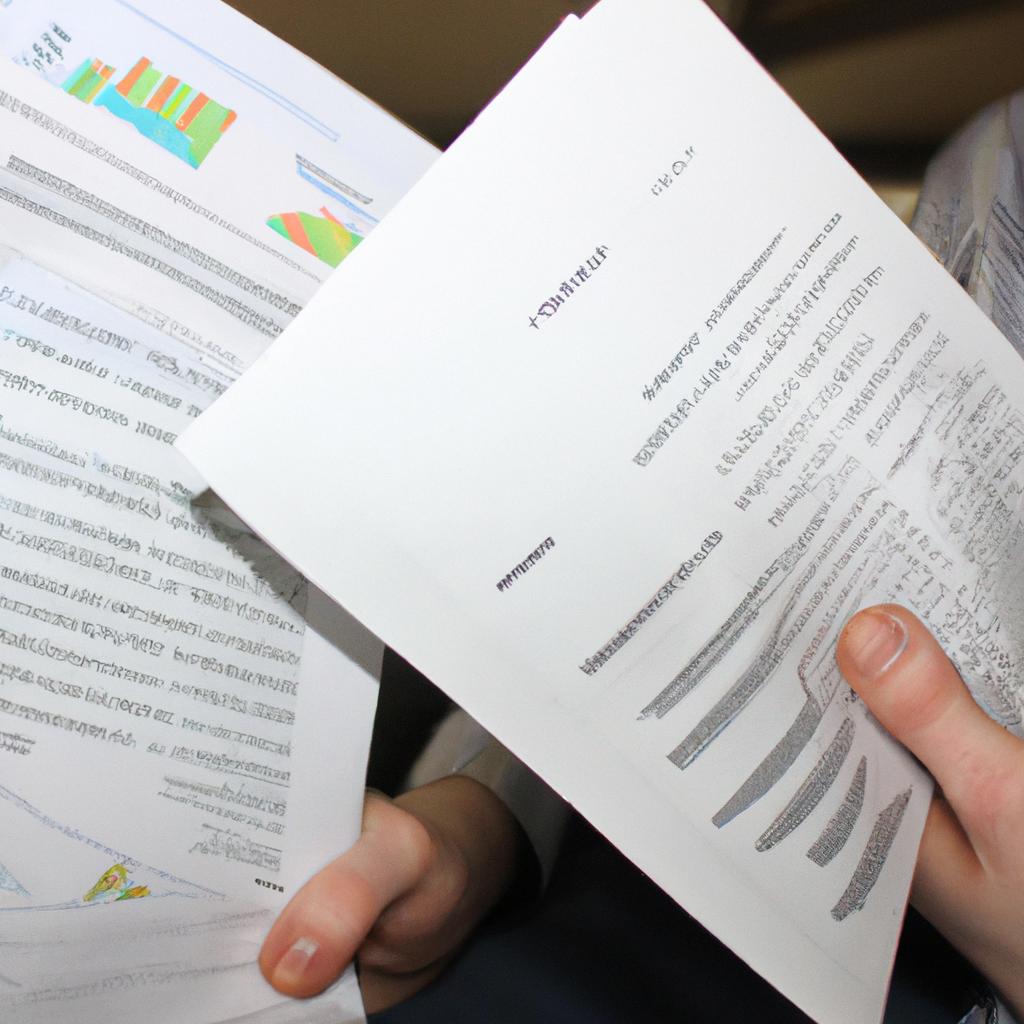Publishing contracts play a crucial role in the financial aspects of a publishing company. These agreements define the terms and conditions under which authors grant their rights to publishers, ensuring that both parties are protected and adequately compensated for their contributions. Understanding the intricacies of these contracts is essential for authors seeking fair compensation and publishers aiming to maximize their revenue streams.
For example, consider a hypothetical case where an author signs a publishing contract with a traditional publishing house. The agreement typically includes provisions regarding royalty rates, advance payments, subsidiary rights, and distribution channels. Royalty rates determine the percentage of book sales that will be paid to the author as compensation. Advance payments, on the other hand, provide authors with an upfront payment before publication based on projected sales expectations. Subsidiary rights encompass additional sources of income such as film adaptations or foreign translations, while distribution channels outline how books will be marketed and distributed to reach readers effectively.
By delving into the financial aspects of publishing contracts, this article aims to shed light on various elements that impact both authors and publishers alike. Through examining real-world examples and analyzing industry practices, we can gain valuable insights into negotiating fair deals and optimizing financial outcomes within the dynamic landscape of the publishing industry.
Important Clauses in Publishing Contracts
Publishing contracts play a crucial role in the relationship between authors and publishing companies. These contracts outline various terms and conditions that govern the publication of an author’s work, ensuring both parties are protected legally and financially. In this section, we will explore some important clauses commonly found in publishing contracts.
One such clause is the royalty payment structure. Royalties are payments made to authors based on book sales or other agreed-upon metrics. For example, let’s consider a hypothetical scenario where an author signs a publishing contract with a 10% royalty rate. This means that for every copy sold, the author would receive 10% of the net revenue generated from those sales. Typically, royalties are paid periodically (e.g., quarterly or biannually) after deducting any applicable expenses.
Another significant aspect of publishing contracts is the grant of rights clause. This clause specifies which rights the author grants to the publisher concerning their work. It may include exclusive rights for specific formats (e.g., print, e-book), territories (e.g., worldwide, regional), and duration (e.g., limited term, perpetuity). The scope of these rights can significantly impact an author’s ability to exploit their work elsewhere or negotiate subsequent deals.
Additionally, termination provisions are fundamental to protect both parties’ interests in case either fails to fulfill contractual obligations satisfactorily. These provisions establish grounds for terminating the agreement and outline procedures for resolving disputes or breaches. They often detail notice periods, dispute resolution mechanisms (such as arbitration or mediation), and potential remedies if one party does not meet its contractual obligations.
To summarize, essential clauses within publishing contracts include royalty structures, grant of rights provisions, and termination clauses. Understanding these aspects helps authors navigate negotiations effectively and secure fair agreements with publishers.
Moving forward into our next section about “Royalty Rates and Advances,” we will delve deeper into how these financial aspects influence an author’s earnings in more detail.
Royalty Rates and Advances
Financial aspects play a crucial role in publishing contracts, as they determine the monetary compensation and benefits for both authors and publishers. In this section, we will explore the various financial elements involved in publishing contracts, highlighting their significance and impact on the parties involved.
One important aspect of publishing contracts is royalty rates. Royalties are typically calculated as a percentage of sales revenue or net receipts from book sales. For instance, let us consider an example where an author signs a contract with a publisher that offers a royalty rate of 10% on the cover price of each book sold. If the book has a cover price of $20 and sells 1,000 copies, the author would receive royalties amounting to $2,000 (10% * $20 * 1,000). It is essential for authors to negotiate favorable royalty rates to ensure fair compensation for their work.
Advances are another key component in publishing contracts. An advance is an upfront payment made by publishers to authors before the publication of their work. This payment serves as initial compensation against future royalties. The amount offered as an advance can vary significantly based on factors such as genre, market demand, and anticipated sales potential. Authors may use advances to support themselves while working on their manuscripts or invest in marketing efforts to promote their books effectively.
When examining publishing contracts’ financial aspects, it is essential to be aware of several considerations:
- Payment schedules: Understand when payments will be made throughout the publishing process – upon signing the contract, manuscript delivery acceptance, publication date, etc.
- Accounting statements: Ensure that provisions exist for regular accounting statements detailing book sales figures and associated royalties.
- Subsidiary rights: Consider whether subsidiary rights like film adaptations or foreign translations are included in the agreement and how revenues from these rights will be shared.
- Reversion clauses: Evaluate conditions under which rights may revert back to the author if specific contractual obligations are not met within specified timeframes.
To provide a comprehensive overview, the table below summarizes some financial aspects commonly found in publishing contracts:
| Financial Aspect | Description |
|---|---|
| Royalty rates | Percentage of sales revenue or net receipts paid as royalties. |
| Advances | Upfront payment made to authors against future royalty earnings. |
| Payment schedules | Timelines for payments throughout the publishing process. |
| Subsidiary rights | Rights associated with adaptations or translations of the work. |
Understanding and negotiating these financial aspects are vital for both authors and publishers to ensure a fair and mutually beneficial agreement. By carefully considering these elements, parties can establish transparent expectations regarding compensation and maximize their potential returns from published works.
Moving forward into the next section on “Rights and Permissions,” we will explore how publishing contracts address various rights granted by authors to publishers, including translation rights, serialization rights, and more.
Rights and Permissions
Transitioning from the previous discussion on royalty rates and advances, it is crucial to delve into another significant aspect of publishing contracts – rights and permissions. Understanding these aspects ensures a comprehensive grasp of the financial landscape within a publishing company. To illustrate this further, let us consider an example where a renowned author grants their publisher exclusive rights to publish their latest novel globally.
Rights and permissions play a pivotal role in determining the potential revenue streams for both authors and publishers. Publishers acquire various types of rights from authors, including print, digital, audio, translation, and merchandising rights. These different forms of intellectual property contribute to diverse income sources such as book sales, licensing agreements, film adaptations, or merchandise tie-ins. For instance, by having exclusive global publication rights for our sample author’s novel, the publisher can negotiate deals with foreign publishers for translated editions or explore opportunities for movie adaptations.
To shed light on how rights acquisition impacts financial outcomes in publishing companies, we present key considerations:
- Scope of Rights: Different territories may have varying market potentials; thus, acquiring worldwide or regional publication rights affects projected revenue.
- Subsidiary Rights Sales: Licensing subsidiary rights such as audiobooks or translations generate additional income beyond traditional book sales.
- Negotiation Leverage: Acquiring exclusive rights gives publishers more leverage when negotiating deals with other media platforms (e.g., film studios or streaming services).
- Long-Term Revenue Potential: By securing long-term publication rights for successful books/authors, publishers can benefit from sustained royalties over time.
The table below summarizes some possible scenarios regarding rights acquisitions and their corresponding financial implications:
| Scenario | Financial Outcome |
|---|---|
| Exclusive Worldwide Rights | Higher revenue potential due to broader reach |
| Non-Exclusive Regional Rights | Limited revenue potential restricted to specific territory |
| Licensing Subsidiary Rights | Additional income from sublicensing agreements |
| Long-Term Publication Deal | Continued royalty earnings over an extended period |
In summary, understanding rights and permissions is vital for publishers as it directly impacts the financial aspects of a publishing company. By acquiring different types of intellectual property rights and leveraging them effectively, publishers can explore diverse revenue streams beyond book sales alone. This ensures sustainable profitability while supporting authors in maximizing their creative outputs.
Transitioning into the subsequent section on accounting and reporting, it becomes evident that accurate financial management plays a crucial role in handling various contractual obligations within a publishing company.
Accounting and Reporting
Having discussed the importance of rights and permissions in publishing contracts, it is now crucial to delve into another significant aspect – the financial considerations within a publishing company. To illustrate these aspects further, let us consider a hypothetical case study involving an independent author who has signed a contract with a publishing house.
Financial Aspects in Publishing Contracts:
When entering into a publishing agreement, authors often encounter various financial terms that can significantly impact their earnings. It is essential for both parties involved to have clarity on these aspects from the outset. Here are some key points to be aware of when considering the financial implications of publishing contracts:
- Royalties: Authors typically receive royalties as compensation for each copy sold. These rates may vary depending on factors such as format (hardcover, paperback, e-book), sales channel (brick-and-mortar stores, online platforms), and territory (domestic or international).
- Advances: Some publishers offer authors an advance payment against future royalties upon signing the contract. This upfront sum provides financial support during the book’s development phase but should be carefully negotiated.
- Marketing Costs: In certain cases, authors may bear partial responsibility for marketing expenses related to promoting their work. Clear guidelines regarding cost-sharing or reimbursement should be specified in the contract.
- Revenue Sharing: For collaborative projects involving multiple contributors or co-authors, revenue sharing arrangements need to be established clearly. This ensures fair distribution of royalties among all participants based on agreed-upon percentages.
To provide a comprehensive overview of these financial aspects, consider the following table outlining different contractual elements and their potential impact on an author’s earnings:
| Contractual Element | Impact on Author’s Earnings |
|---|---|
| Royalty Percentage | Determines royalty amount received per sale |
| Marketing Costs | Can reduce author’s net earnings if they bear a portion of expenses |
| Advance Payment | Provides initial financial support, but reduces future royalty earnings until recouped |
| Revenue Sharing | Ensures fair distribution of royalties among contributors |
Contract Duration and Termination:
Understanding the financial aspects within publishing contracts is crucial not only for authors but also for publishers. However, it is equally important to consider the duration and termination clauses within these agreements. The subsequent section will delve into these topics in more detail, examining the contractual obligations regarding timeframes and potential scenarios leading to contract termination.
Contract Duration and Termination
In the world of publishing contracts, careful accounting and reporting play a vital role in ensuring transparency and financial stability within a publishing company. By accurately tracking revenues, expenses, and royalties associated with each contract, publishers can make informed decisions, assess profitability, and maintain healthy business relationships with authors.
To illustrate the importance of accounting and reporting in publishing contracts, let’s consider a hypothetical scenario involving a bestselling author who has signed a multi-book deal with a publishing house. As part of this agreement, the publisher is responsible for providing regular royalty statements to the author, detailing sales figures, deductions, and ultimately calculating the author’s earnings.
Effective accounting practices enable publishers to fulfill their obligations promptly while also building trust with authors. By maintaining accurate records of book sales across different formats (e.g., print copies, e-books), territories, and distribution channels, publishers can ensure that all relevant parties receive their fair share of revenues generated from these sales.
When it comes to reporting on publishing contracts’ financial aspects, several key considerations come into play:
- Transparency: Clear and comprehensive reports help foster open communication between publishers and authors by providing detailed breakdowns of income sources (such as advances or subsidiary rights) as well as any associated costs or deductions.
- Timeliness: Publishers must adhere to agreed-upon deadlines for issuing royalty statements to authors. Prompt reporting not only demonstrates professionalism but also allows authors to monitor their earnings regularly.
- Accuracy: Avoiding errors or discrepancies in financial reports is crucial for maintaining positive relationships with authors. Mistakes can lead to misunderstandings or even legal disputes if left unresolved.
- Confidentiality: Protecting sensitive financial information is essential when dealing with contractual matters. Publishers should handle data securely and communicate only necessary details regarding an author’s earnings.
By prioritizing effective accounting practices and transparent reporting mechanisms in publishing contracts, both publishers and authors benefit from increased clarity surrounding finances. This approach fosters trust between parties and enables them to make informed decisions about future collaborations.
Next section: Contract Duration and Termination
Negotiating and Renegotiating Contracts
Contract Duration and Termination
Now that we have explored the various aspects of contract duration and termination, let us delve into another crucial aspect of publishing contracts – the financial considerations. To better understand this, let’s consider a hypothetical scenario involving an up-and-coming author named Sarah.
Sarah, a talented writer with immense potential, signs a publishing contract for her debut novel. As part of the agreement, she is entitled to receive royalties based on book sales. However, it is essential to note that there are several financial factors that can significantly impact an author’s earnings within the context of a publishing contract.
Firstly, royalty rates play a pivotal role in determining an author’s income from their work. These rates can vary widely depending on factors such as genre, market demand, and negotiation power. For instance, established authors may be able to secure higher royalty rates due to their reputation and track record. On the other hand, new or lesser-known authors might need to settle for lower rates initially but could negotiate higher percentages for subsequent works if they achieve success.
Furthermore, advances provided by publishers also contribute to an author’s financial stability throughout the writing process. An advance acts as an upfront payment against future royalties and serves as a form of investment made by the publisher in anticipation of successful book sales. The amount offered can vary greatly depending on factors like the author’s popularity, market trends, and perceived commercial viability of the book.
To shed light on these financial considerations further, here is a bullet point list summarizing key points:
- Royalty rates significantly impact an author’s earnings.
- Established authors may command higher royalty rates than newcomers.
- Advances provide financial support during the writing process.
- The amount of advances varies based on numerous factors such as market trends and an author’s standing within the industry.
In addition to understanding royalty rates and advances, it is vital for authors to comprehend how different clauses in their contracts can affect their financial well-being. The table below presents a simplified breakdown of some common contract clauses and their potential impact on an author’s earnings:
| Contract Clause | Potential Impact |
|---|---|
| Rights Reversion | Allows the author to regain control over rights |
| Non-compete clause | Restricts the author from publishing elsewhere |
| Subsidiary rights | Expands revenue opportunities beyond book sales |
| Cross-collateralization | Merges multiple works for royalty calculations |
Understanding these contractual terms is crucial as they directly influence an author’s overall income and career trajectory.
In summary, this section has explored the financial aspects within publishing contracts. We have seen how royalty rates, advances, and various contractual clauses contribute to an author’s earnings. By comprehending these elements and negotiating favorable terms, authors can ensure both creative fulfillment and financial success in their writing careers.
 Freebirds Publishing
Freebirds Publishing



